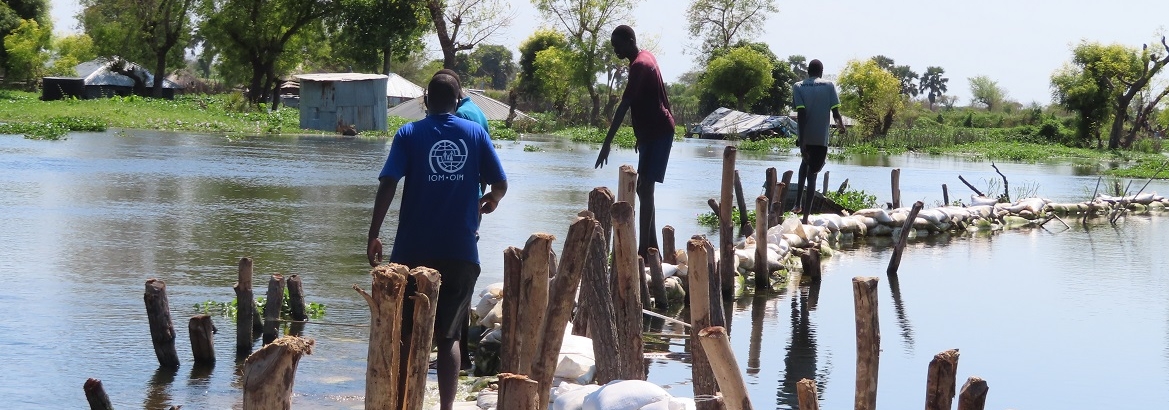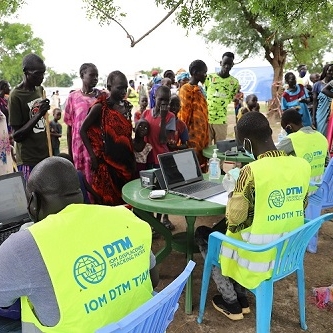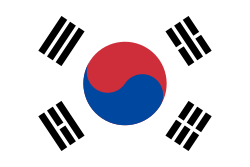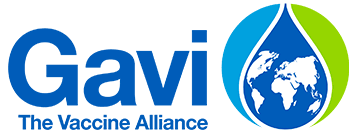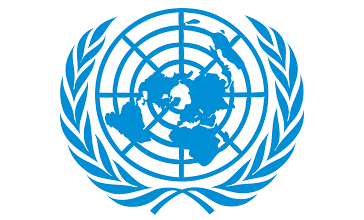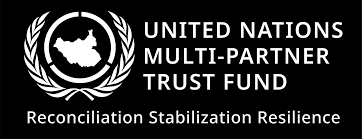IOM Vision
IOM, in partnership with key stakeholders and communities, will continue to support vulnerable people across South Sudan with essential life-saving assistance, whilst creating conducive environments for sustainable returns and recovery. IOM will adopt a community-driven approach to all programming, to facilitate transformative changes that address vulnerability and risks. Tackling these challenges means not only making a positive and lasting impact on the lives of South Sudanese affected by crises but also supporting the government in fulfilling the promises of the Revitalized Peace Agreement, creating a base of support for its continued efforts to address potential drivers for future crises.
Objective
Saving lives and protecting people on the move
|
IOM foresees that humanitarian support will be needed for three population groups: (1) IDPs, both protracted and newly displaced populations; (2) IDPs and other migrants who have returned and continue to face a variety of challenges; and, (3) vulnerable host communities affected by natural disasters and/or conflict and in areas in which services are limited. IOM is committed to the centrality of protection and implementing needs-based programming guided by protection vulnerability analyses, targeting the most vulnerable populations ensuring the specific needs of women, girls, and traditionally underserved groups are addressed. |
IOM will also provide training to government officials and support national NGOs (NNGOs) and associations for persons with disabilities with technical support. Entities targeted will include the Relief and Rehabilitation Commission (RRC), Office of the Governor; Ministry of Gender, Child and Social Welfare, Active Youth Agency, the Organization for Children Harmony, and various organizations for persons with disabilities in Juba, Wau and Aweil – such as the Central Equatoria Society for Visually Impaired Persons and Association for Persons with Hearing Impairments
|
To support internally displaced persons and affected communities, in 2022 IOM will:
|
|
IOM will continue to undertake standalone protection activities as well as mainstream protection, including gender-based violence (GBV) risk mitigation, across programming, and maintain close coordination with key protection partners and relevant clusters and technical working groups. Key activities will include:
|
|
In line with the IOM Manual on Community-Based Mental Health and Psychosocial Support (MHPSS) in Emergencies and Displacement, IOM will continue offering focused non-specialized MHPSS services. Activities will include:
|
|
IOM will continue its static, mobile, rapid response team, and comprehensive care and treatment strategy, with a focus on integrated emergency lifesaving primary health care, and routine immunization for IDPs, returnees, and host communities. Activities will include:
|
|
As one of the largest WASH actors in South Sudan, IOM will continue to ensure the provision of WASH services in existing areas of operation, whilst mobilizing its emergency preparedness and response (EP&R) teams in order to rapidly restore service provision in response to crises (famine-like conditions, conflict-/flood related displacement) and prevent infectious diseases such as Hepatitis E Virus, acute watery diarrhea/cholera and COVID-19 thus safeguarding and preventing public health risks. Activities will include:
|
|
IOM will continue to provide emergency shelter and NFI support across South Sudan, with the most appropriate modalities determined through comprehensive needs and market assessments, with special consideration to persons with special needs and other vulnerable groups throughout the project cycle, including:
|
|
IOM will provide assistance to survivors of human rights violations, including those arising from the conflict. Activities will include:
|
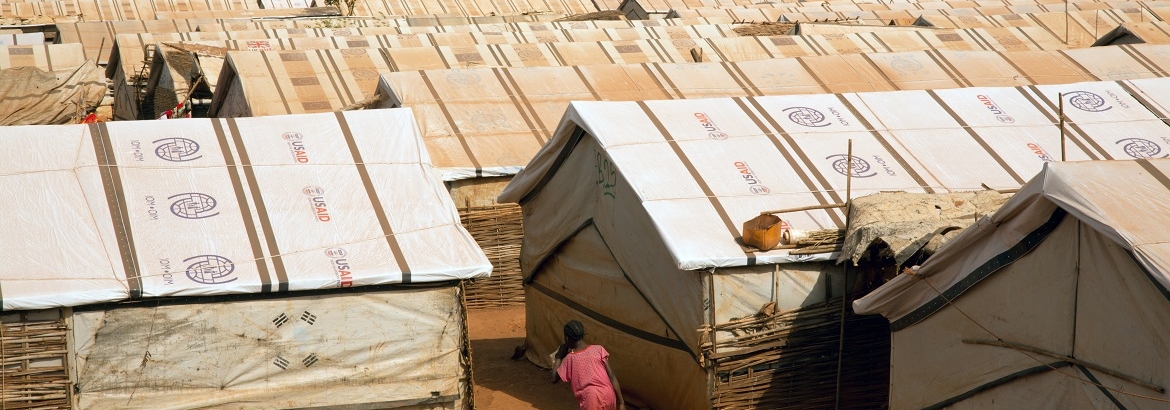
Objective
Driving solutions to displacement
|
IOM foresees that emergency response support will be needed for three population groups: (1) IDPs, both protracted and newly displaced populations, based on context specific vulnerability analyses and emergency gaps analysis; (2) IDPs and migrants who have returned, who continue to face challenges in accessing services, livelihood opportunities, and housing, land, and property; and (3) vulnerable host communities in areas in which services are limited. Key beneficiaries will include vulnerable community members such as women and children as well as community leaders, civil society, local authorities, and relevant ministries. IOM is committed to implementing needs-based programming to reach those that are most vulnerable. Targeting of beneficiaries will be based on protection concerns and context-specific vulnerability analyses. |
|
IOM will scale up efforts to strengthen resilience of healthcare systems, community health resilience, referral networks, and the Ministry of Health (MOH) and NNGOs to assume an increasing role in health service delivery, including:
|
|
IOM will support peace and social cohesion through targeted activities to address drivers of conflict that are blocking returns and recovery, as well as integrating community-level peace and cohesion activities throughout all interventions. Conflict issues blocking or arising from returns and reintegration of displaced persons will be regularly identified through analyses, partners and local stakeholders. Activities will include:
|
|
IOM will continue advancing national land legislation in conjunction with national ministries and parliamentarians, while simultaneously serving individual HLP needs at the grassroots level. Activities will include:
|
|
IOM will continue to design and deliver locally-driven, development-principled initiatives that facilitate transformative change that addresses the drivers of vulnerability and risk, and mitigate further displacement, with a focus on access and provision of essential services, economic recovery, and local governance and social cohesion. Activities will include:
|
|
In line with IOM’s Progressive Resolution of Displacement Situations Framework, IOM South Sudan will deliver multi-tiered initiatives that reinforce the agency of individuals, households and communities combined with systemic support to create environments conducive to the resolution of displacement and sustainable returns and recovery. Activities will include:
|
|
In line with IOM's Manual on Community-Based Mental Health and Psychosocial Support (MHPSS) in Emergencies and Displacement, IOM will integrate MHPSS with conflict transformation and mediation activities, as well as within wider livelihood efforts. Activities will include:
|
|
IOM will continue to respond to water, sanitation and hygiene needs, supporting the prevention of infectious diseases outbreaks such as Hepatitis E virus, acute watery diarrhoea/cholera and COVID-19 and GBV prevention to safeguard and prevent public health risks and reduce violence whilst moving towards approaches that strengthen the sustainability of efforts, through improved WASH-GBV linkages, as well as a shift towards WASH market-based programming, in support of markets and livelihoods. Activities will include:
|
Objective
Strengthen preparedness and reduce disaster risk
IOM will continue to work with relevant Ministries such as the Ministry of Humanitarian Affairs and Disaster Management (MHADM) for policy development, communities prone to floods and other natural disasters to mitigate flood risks through community-based disaster management committees. IOM will also continue to work closely with the Ministry of Health (MOH) to strengthen health systems to prevent, detect and respond to complex communicable disease outbreaks, such as COVID-19, cholera, measles, Ebola Virus Disease (EVD) and other health threats, as well as building capacity of health and social workers.
|
As co-lead for the COVID points of entry (POE) technical working group, co-chair of the emergency responders mechanism, a member of the health cluster strategic advisory group, GAVI/MOH Immunization Committee, and several technical working groups, IOM will continue to scale up efforts to ensure that health systems are strengthened to better prevent, detect and respond to complex communicable disease outbreaks and health threats, including through early warning alert response systems for surveillance and response to disease outbreaks. Activities will include:
|
|
As coordinator of the MHPSS TWG at the national level, IOM will strengthen efforts at the community level, including capacity building of key actors, and integration of MHPSS considerations within wider humanitarian-development-peace efforts. Activities will include:
|
|
IOM will ensure that vulnerable communities benefit from WASH interventions that are scalable, sustainable, adaptable and resilient, using context-appropriate technologies and ensuring capacity building for sustained management. Activities will include:
|
|
IOM’s programmes will focus on disaster risk reduction and preparedness, to enhance community resilience such that their knowledge and coping mechanisms are increased to meet the challenges of climate shocks, in particular, flooding in the Nile Basin which is highly prone to water-induced hazards, with Jonglei, Upper Nile, Warrap and the Equatorias representing severe flood-prone areas; enhance the effectiveness of disaster risk mitigation measures to mitigate displacement and food insecurity, and inform and influence policymakers and the humanitarian community on disaster risk reduction. Activities will include:
|
|
Through the provision of tailored capacity building and technical assistance, IOM will build the capacity of relevant stakeholders, including national and local authorities, NGOs, and community leaders on disaster risk management, preparedness and response, based on comprehensive and context-specific needs assessments, including through:
|
|
As co-lead of the Points of Entry (PoE) technical working group, IOM has strong experience in providing technical support and collaborating with key frontline government and non-governmental partners to enhance border health and mobility management capacities. In line with national contingency plans, IOM will continue to support prevention and response efforts of the MOH at PoE, through coordinated multi-sectoral responses.
|
Objective
Contribute to an evidence-based and efficient crisis response system
|
IOM’s will target 305 partner organizations, including UN agencies, funds and programs, with the provision of information on the number and geographic distribution of IDPs and returnees, mixed migration trends, infrastructural gaps and the evolving needs of crisis-affected populations to enable better planning. IOM will also continue to promote access to multi-sectoral humanitarian services for vulnerable communities through the provision and management of the core WASH and S-NFI pipelines and support to the logistics cluster for efficient and economic transportation of items, as well as the establishment and management of humanitarian hubs and disbursement of funds through the rapid response mechanism. |
|
Leveraging a countrywide network of over 6,500 key informants and close to 700 local enumerators, IOM will continue to provide granular, accurate and regularly updated information on the number and geographic distribution of IDPs and returnees, trends in mixed migration flows and the evolving needs of crisis-affected populations. Activities will include:
|
|
South Sudan
The map used here is for illustration purposes only. Names and boundaries do not imply official endorsement or acceptance by IOM.
Figures are as of 31 December 2023. For more details of IOM's operational capacity in country, please see the IOM Capacity section.

